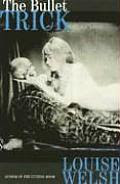 by Louise Welch
by Louise WelchCanongate Books
reviewed by Jodie
When a book or a film about stage magicians appears I think every reader knows what they’re looking for. Well realised characters are important and an atmospheric setting heightens all the creepy feelings that surround magicians but above all a book about professional magic must have a very clever plot, centering around deceptions that the reader just can not figure out unaided. It is essential that the reader be astounded by the author’s clever sleight of hand at least once and that they are stunned not only by the result of a trick but also by the explanation of how a trick is realised. Readers want to see behind the stage curtain and find the practical steps that make up an illusion, such as a woman shot but left unharmed, as fascinating as the spangly performance they have just seen. So many novels and films that centre around stage magic fail to understand the importance of a sharp plot or worse underestimate their reader’s ability to spot the pigeon hidden up their sleeves.
Louise Welsh’s ‘The Bullet Trick’ suffers from a hybrid problem where she seems to believe that one of her plot resolutions is cleverer than it is and later abandons any attempt at an explanation of a magic trick. This is a shame as both her characters and settings are superb. Welsh sets her novel in a mixture of London, Glasgow and Berlin, jumping from the present to the recent past following William a second rate stage magician with a heavy conscience caused by some murky crime. William is charming in a self-deprecating way, immensely likeable and a great story teller, a true underdog. Readers are given enough information about his personality to enjoy spending time with him but plenty is held back to keep his story blurry and intriguing. The well timed switches of location encourage the reader to expect an accomplished piece of misdirection later in the book, which makes the lack of special plot tricks towards the end of the book even more disappointing.
William gets involved in some messy business after a private magic show for the police in
However when it is time for Welsh to show us how the trick that the entire novel apparently hinges on is done it turns out she has raised her reader’s hopes for nothing. Many things that the author thinks she is concealing will be obvious long before her characters publically display them to anyone who has read a few mystery novels. William’s trickery of the dangerous police officer at the end of the book is dull and unworthy of a book which earlier contains so many promises and realizations of powerful violence. When William asks someone to enlighten him as to how a major magic trick was worked so that it even fooled him Welsh seems to have discarded the magic aspect of her book as unnecessary and has a character produce an empty, unsatisfactory answer of ‘smoke and mirrors’. While plot twists should not be everything in a novel this lack of effort will be a let down for readers expecting a sophisticated, well engineered magical spectacular.

No comments:
Post a Comment